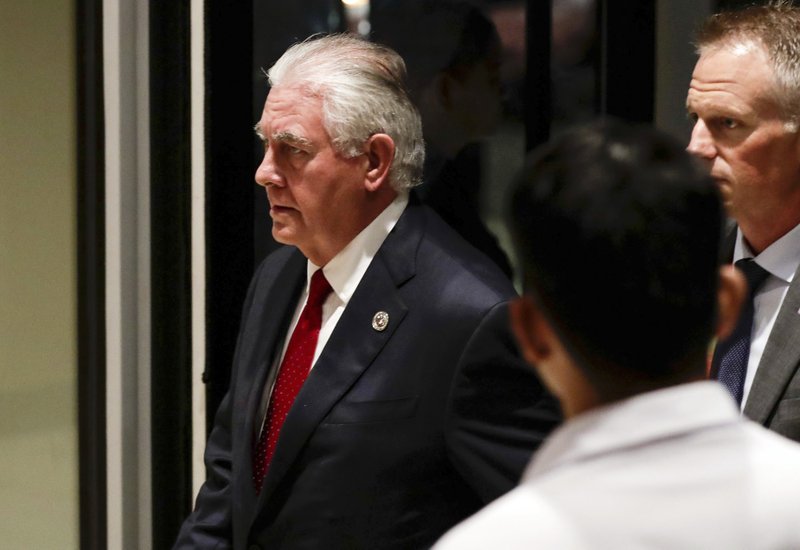MANILA, Philippines -- President Donald Trump's administration has yet to decide how to respond to Russia's move to expel hundreds of American diplomats but plans to deliver a response to Moscow by Sept. 1, Secretary of State Rex Tillerson said Monday.
A day after sitting down in the Philippines with Russia's top diplomat, Tillerson said he'd asked "clarifying questions" about the Kremlin's retaliation announced last month in response to new sanctions passed by Congress. Trump signed the bill last week. The Trump administration has struggled to determine how Russia's move will affect the U.S. diplomatic presence in the country, as well as the broader implications for the troubled relationship between the nuclear-armed powers.
Despite the move, Russian Foreign Minister Sergey Lavrov emerged from the meeting declaring a readiness for more engagement with the U.S. on North Korea, Syria and Ukraine, among other issues. Tillerson broadly echoed that sentiment, saying the two countries had critical national security issues to discuss despite deep disagreements on some matters.
"I don't think it is useful to just cut everything off on one single issue," Tillerson said after his first meeting with Lavrov since the new sanctions were imposed. "These are two very large countries and we should find places that we can work together, let's try to work together. Places we have our differences, we're going to have to continue to find a way to address those."
[PRESIDENT TRUMP: Timeline, appointments, executive orders + guide to actions in first 100 days]
Tillerson also said that Russia has been showing "some willingness" to start talking about a resolution to the crisis in Ukraine, devoid of real progress for years. That assessment came as Lavrov announced that the Trump administration had committed to sending its new special envoy for Ukraine negotiations, Kurt Volker, to Moscow to discuss next steps.
Yet several obstacles hang over any attempt to pursue a more functional U.S.-Russia relationship: the new U.S. sanctions, Russia's retaliatory move to expel diplomats, and the ongoing U.S. Justice Department investigation into Russia's election meddling and possible Trump campaign collusion.
Fearing that Trump might move to ease sanctions on Russia, Congress last month passed new legislation that both added more sanctions and made it harder for the president to lift them. Trump and Tillerson opposed the legislation, but facing a likely veto override, Trump signed the bill.
Moscow's response to the sanctions was to announce it would force the U.S. to cut its embassy and consulate staff in Russia by 755 people. That move stoked confusion in Washington, given that the U.S. is believed to have far fewer than 755 American employees in Russia.
Lavrov, describing his meeting with Tillerson, said Russia and the U.S. had agreed to resume a high-level diplomatic channel that Moscow had suspended after a previous U.S. move to tighten existing Russia sanctions.
Trump's administration has argued there's good reason for the U.S. to seek a more productive relationship.
Tillerson has cited modest signs of progress in Syria, where the U.S. and Russia recently brokered a cease-fire in the war-torn country's southwest, as a sign there's fertile ground for cooperation.
The Syrian cease-fire reflected a return of U.S.-Russia cooperation to lower violence there. The U.S. had looked warily at a series of safe zones in Syria that Russia had negotiated along with Turkey and Iran -- but not the U.S.
[DOCUMENT: Read the full text of the sanctions bill]
Tillerson said Russian meddling in the election had "created serious mistrust between our two countries." Although he and other Cabinet officials have maintained that position consistently, Trump has repeatedly questioned U.S. intelligence about Moscow's involvement while denying any collusion with his campaign.
Information for this article was contributed by Nataliya Vasilyeva and Deb Riechmann of The Associated Press.
A Section on 08/08/2017
